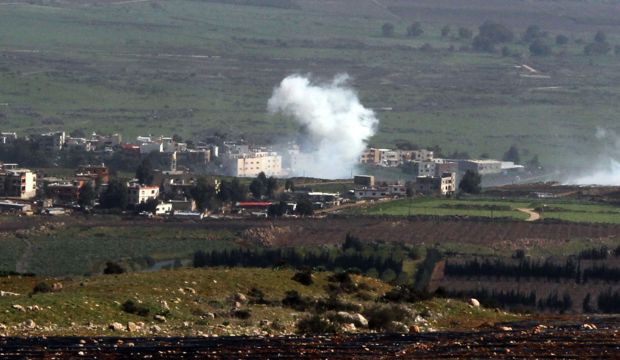
Smoke from Israeli shelling billow from the Lebanese town of Al-Majidiyah on the Lebanese border with Israel on January 28, 2015. (AFP PHOTO / ALI DIA)
In a statement, Hezbollah said its fighters destroyed a number of Israeli vehicles that were carrying Israeli officers and soldiers and caused casualties among “enemy ranks.”
It said the attack was carried out by a group calling itself the “heroic martyrs of Quneitra,”—suggesting it was retaliation for an Israeli airstrike on the Golan Heights on January 18 that killed six Hezbollah fighters and an Iranian general.
The Israeli military said an anti-tank missile hit an Israeli military vehicle near the Israeli-Lebanese border on Wednesday. It did not immediately report any casualties, and said residents of the area have been ordered to remain in their homes.
Wednesday’s attack took place near Mount Dov and the Shebaa farms, a disputed tract of land where the borders of Israel, Lebanon and Syria meet.
Two Lebanese officials said the Israeli shelling targeted the border villages of Majidiyeh, Abbasiyeh and Kfar Chouba near the Shebaa Farms area. They spoke on condition of anonymity in line with regulations.
On the Lebanese side, there were also no immediate reports of casualties. Families living on the border of the villages fled further within, fearing they’d be hit, said the officials, who are based in south Lebanon.
One of the Lebanese officials said the incident is believed to be a “sophisticated Hezbollah operation” targeting Israeli vehicles along the border.
The attack comes shortly after Israel launched airstrikes targeting Syrian army artillery posts in response to rockets fired the previous day into the Israeli-held Golan Heights.
Israel has declined to comment on any connection to the January 18 airstrike, but has braced for a response to the strike, beefing up its air defenses and increasing surveillance along its northern frontier.
Israel says the Shebaa Farms is part of the Golan Heights, which it captured from Syria in 1967. Lebanon and Syria say the enclave belongs to Lebanon, while the United Nations says the area is part of Syria and that Damascus and Israel should negotiate its fate.
The latest salvos raised the possibility of renewed fighting along the Lebanese-Israel border, which has remained mostly quiet since a month-long war in the summer of 2006. Since then, Israel has responded with airstrikes and artillery fire following a number of rocket attacks and shootings but the violence remained contained.
